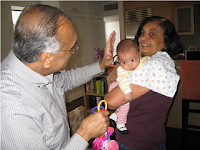In Praise of Older Parents
 |
| Photo credit: Laila and the Grandparents Virji, by Salim Virji |
There are some definite advantages to being midlife parents. Older men tend to be more involved fathers.
The baby boomer fathers today may not remember having much affection or physical contact from their dads. They are changing this trend by being more involved with their children and being more committed to fatherhood.
Older parents are more established in their careers. Once career issues are ironed out, children are less of a threat, and parents can devote more time to their families.
This also allows for greater financial stability when raising children. It also means parents can probably afford quality child care.
Midlife parents say they are more patient, calm, and better able to go with the flow than when they were younger. They've reached a new maturity level.
They don't need children to fulfill their ambitions and prove they are good people. Their children are freer to be individuals and grow up with loving, supportive parents.
Older parents also make more time to spend with their children. They want to make the most of the wonderful gift they've been given.
Where there's an up, there's a down, and there are some disadvantages to being an older parent. The most obvious is age.
How will children feel about having older parents? How old will parents be when their children graduate from high school or college?
Age can cause some isolation from other parents who are much younger. Older parents may have less energy, but parents today are very health conscious and that isn't as much of a drawback.
The big question is how much energy will parents have to play something like soccer at age 50?
Having a baby at any age is a big decision. Age shouldn't make a difference in how much a parent loves and cares for a child.
Children love their parents, whatever their age.
TODAY'S BOOK SUGGESTION:
 The Impatient Woman's Guide to Getting Pregnant
The Impatient Woman's Guide to Getting Pregnantby Jean M. Twenge Ph.D.
-- Complete guide to the medical, psychological, social, and sexual aspects of getting pregnant, told in a funny, compassionate way, like talking to a good friend who's been through it all.
And in fact, Dr. Jean Twenge has been through it all—the mother of three young children, she started researching fertility when trying to conceive for the first time.
A renowned sociologist and professor at San Diego State University, Dr. Twenge brought her research background to the huge amount of information—sometimes contradictory, frequently alarmist, and often discouraging—that she encountered online, from family and friends, and in books, and decided to go into the latest studies to find out the real story.
The good news is:
There is a lot less to worry about than you've been led to believe. Dr. Twenge gets to the heart of the emotional issues around getting pregnant, including how to prepare mentally and physically when thinking about conceiving, how to talk about it with family, friends, and your partner, and how to handle the great sadness of a pregnancy loss; as well as how to know when you’re ovulating, when to have sex, timing your pregnancy, maximizing your chances of getting pregnant, how to tilt the odds toward having a boy or a girl, and the best prenatal diet.
Trying to conceive often involves an enormous amount of emotion, from anxiety and disappointment to hope and joy.
With comfort, humor, and straightforward advice, The Impatient Woman's Guide to Getting Pregnant is the bedside companion to help you through it.
Click to order/for more info: The Impatient Woman's Guide to Getting Pregnant
Don't have a Kindle? Get your Kindle here, or download a FREE Kindle Reading App.
Category: midlife parents, Too Old










Good, balanced description. Not that younger parents cannot enjoy financial stability and sufficient time with their kids, but some of these things sometimes do get easier with age. Thanks for posting :-)